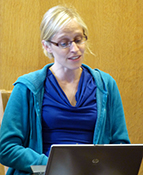- Campuses :
- Twin Cities
- Crookston
- Duluth
- Morris
- Rochester
- Other Locations

center for writing
mwp.umn.edu
Laura Stelter
©2014
 Bus Sisters
Bus Sisters
I first noticed Karen sitting on the bench at the bottom of the park-and-ride stairwell, a plastic drawstring bag full of yarn on her lap and a crochet hook swiftly darting through loop after maroon loop. I catalogued her presence—middle-aged lady with yarn—and went to stand in line for the bus.
The other riders and I avoid eye contact, on our phones, furtively glancing at one another, gathering bits of information. Duc Le works at Valspar, according to his badge. Two others work at Target’s corporate headquarters. A surprising number are pregnant. Many carry their lunch with them, but not the men in suits.
When the bus arrives, we stream forward in our orderly line, rapidly spilling into the seats. People eschew contact, finding the empty rows first, though it’s clear the bus will be full. I move all the way to the back, the very last seat in a row of five, and lean against the window. I remove a book from my bag, prepared to engage in the strange avoidance dance of the crowded bus.
Karen sits in the middle of my row. She looks toward the rotund man in a light green polo shirt sitting opposite me, who is focused on his phone screen. She laughs awkwardly in his direction, mutters something, tries to engage him. No luck. He redoubles his effort to appear busy on his phone. The bus is nearly full, and two others come to join us, so she gives up on him and scoots in my direction. I am staring intently at my book, though I haven’t read a word. I catch the eye of the woman who sits down next to Karen. We quickly look away. In the meantime, Karen has resumed her frenetic effort to crochet every strand of yarn in her overstuffed bag. She asks the new woman if she knows how to crochet. The woman smiles, says no, and dives into her phone screen. Karen looks down at her yarn.
I set down my book. She seems so earnest in her desire to start a conversation, but after two rejections, she does not turn to me. “What are you crocheting?” I ask. Karen turns and peers at me, hesitant, trying to decide if I’m addressing her, like she is afraid I am making fun of her. Her narrow, heavily freckled face is shaded by a grey baseball hat with the word “DREAM” in rhinestones above the bill. From her face, it appears she is in her late forties or early fifties, at least fifteen years my senior. Yet her voice belies her appearance, lacking the confidence of age.
“Well, I crochet all kinds of things,” she softly responds. She pulls out a variety of many-colored objects one after the other: a cup cozy, potholder, washcloth, wristband, and a small rectangle that has yet to find a purpose. I listen and nod as she lovingly describes each piece. Gaining courage, her words begin to flow.
“I’m Karen, by the way. Do you know how to crochet? I can teach you…I’ve taught a lot of people over the years. Just yesterday, I taught a woman from Ethiopia, and I gave her a hook and some yarn…but I didn’t want to give her my scissors,” she coos at her bag, affectionately pulling out a green and white children’s scissors, then tucking it back in. She tells me about the yarns—cotton, acrylic, wool, all purchased at Wal-Mart.
I respond, “I’m Laura. I knit, but I haven’t tried crocheting. I never got much past making a chain....” I don’t have time to mention the failed hat that turned into a potholder. She is pulling out a rose-colored washcloth to show me. I tell her how lovely the lace pattern is.
“Oh, do you like it?” she asks. “I can teach you how to do it…,” She snips off the bit of work she had been doing and continues with the maroon yarn, skillfully creating her foundation chain, then building it: chain one...two...three...double crochet. As she works, the story of her life gently bubbles out. The joys and disappointments—little hurts and big ones—her family, her friends from the National Guard, working in a bakery with a difficult boss, and now working at the Salvation Army. I comment here and there, primarily just taking in her narrative.
Karen stops suddenly and leans closer to me.
“We’re the only ones talking!” she confides from behind her cupped hand. An expression of delight crosses her face. To Karen, we are sisters telling secrets on the back of the bus.
After a few more minutes, she notes again, “No one talks. It’s too bad. Can you believe we are the only two talking?”
It’s true. Ours is the only conversation on the bus. Every so often, she pauses to point this out, and I smile and agree that it seems strange for so many people to have so little to say to one another.
I look up and realize we are already downtown; we are nearly at her stop. She hands me a slip of paper with her name and number and tells me to text her the name of a knit and crochet community website I mentioned so that she doesn’t forget it. As she is preparing to go, she reaches into her bag and hands me the brightly colored cup cozy that she first showed me when our conversation began.
“Here, take this! Don’t forget to text me!”
I thank her and slide it onto my wrist for safekeeping as she hurries off the bus.
...
At home, I pick up my phone, then set it back down. Her number still in my purse, I sip my tea, hands wrapped around brightly colored yarn.



